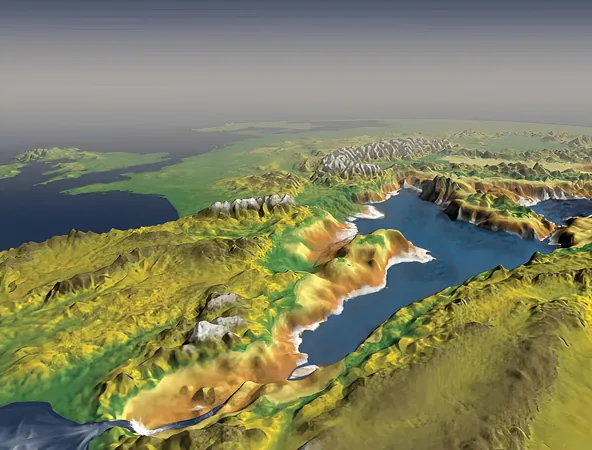
The Mediterranean Sea's Water Loss: A Historical Crisis with Modern Implications
2024-12-01
Author: Ken Lee
The Mediterranean Sea's Water Loss: A Historical Crisis with Modern Implications
Over six million years ago, a geological phenomenon known as the Messinian Salinity Crisis dramatically reshaped the Mediterranean Sea. This event turned the once-verdant basin into a vast salt flat, a transformation that has continued to baffle scientists until recently.
A groundbreaking study has unlocked the mystery behind this massive desiccation, revealing that chlorine isotopes in the salt deposits on the seafloor indicate two critical phases of extreme evaporation that led to this unprecedented water loss.
Phases of Drying and Salt Accumulation
The first phase of desiccation lasted approximately 35,000 years, affecting the eastern Mediterranean predominantly. During this period, the Mediterranean's connection to the Atlantic was restricted, leading to high salinity levels in the eastern basin, where salt began to accumulate.
The second phase unfolded much more swiftly, within a mere 10,000 years, as salt deposition spread throughout the entire Mediterranean region. This rapid evaporation caused sea levels to plummet dramatically—by 1.7 to 2.1 kilometers in the east and 0.85 kilometers in the west—resulting in the loss of up to 70% of the sea's total water volume.
Such an extensive decline in water levels had profound effects, instigating local volcanic activity due to the release of pressure on the Earth's crust. These eruptions were not merely coincidental; they were Earth's response to the rapid loss of weight from the water above.
Widespread Consequences Beyond the Basin
The ripple effect of the Mediterranean's water loss extended far beyond its shores, likely altering global climate patterns. Changes in the basin's geology and hydrology potentially influenced weather systems worldwide, demonstrating the interconnectedness of Earth's systems.
As the Mediterranean reached its low point, its sea level sank almost a kilometer below that of the Atlantic Ocean. This stark difference caused the eventual collapse of the Strait of Gibraltar, allowing waters from the Atlantic to surge back, thereby ending the prolonged desiccation.
Impact on Marine Life
The Messinian Salinity Crisis presented dire challenges for marine ecosystems. The hypersaline environment would have been disastrous for many marine species, leading to mass extinctions of those unable to adapt to such extreme conditions. However, some extremophiles managed to survive in this inhospitable climate. Evidence from fossil records indicates that isolated refugia of less saline water existed, offering temporary shelters for certain resilient species amid the ecological turmoil.
Restoration and Recovery of the Mediterranean
The reopening of the Strait of Gibraltar allowed a flood of Atlantic water to restore the Mediterranean to its previous state. This transformative moment marked the end of the salinity crisis, reestablishing a thriving marine ecosystem and reshaping the region's geography for millennia to come.
Modern-Day Lessons from Ancient Crises
The study of the Messinian Salinity Crisis offers vital insights into understanding present-day environmental challenges. It highlights how rapid geological and hydrological changes can lead to significant climate and ecological shifts, a concern that resonates amid today's climate crisis characterized by rising temperatures and changing precipitation patterns.
By studying historical events, scientists stress the need for global collaboration and sustainable resource management to mitigate the effects of impending environmental challenges. This research serves as a reminder of the lessons learned from the past and the ongoing need to implement these insights into modern planning efforts.
Conclusion: Preparing for the Future
The legacy of the Mediterranean Sea's water loss is more than a historical curiosity; it serves as a stark reminder of the potential consequences of geological upheavals on climate and ecosystems. As scientists continue to unveil the details of this past crisis, we are urged to ask ourselves: Will we apply these lessons to safeguard our future? The findings call for a proactive approach, integrating historical knowledge into contemporary strategies to protect our communities and the environment from the looming threats of climate change.
This research, led by G. Aloisi from the French National Centre for Scientific Research (CNRS), has been published in the journal *Nature Communications*, drawing attention to the importance of understanding our planet's history to better prepare for its future.


 Brasil (PT)
Brasil (PT)
 Canada (EN)
Canada (EN)
 Chile (ES)
Chile (ES)
 España (ES)
España (ES)
 France (FR)
France (FR)
 Hong Kong (EN)
Hong Kong (EN)
 Italia (IT)
Italia (IT)
 日本 (JA)
日本 (JA)
 Magyarország (HU)
Magyarország (HU)
 Norge (NO)
Norge (NO)
 Polska (PL)
Polska (PL)
 Schweiz (DE)
Schweiz (DE)
 Singapore (EN)
Singapore (EN)
 Sverige (SV)
Sverige (SV)
 Suomi (FI)
Suomi (FI)
 Türkiye (TR)
Türkiye (TR)